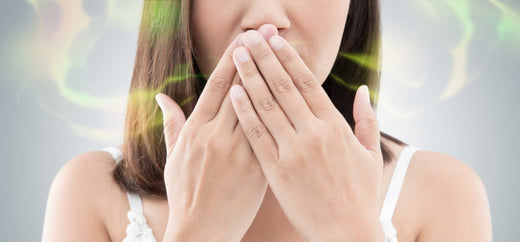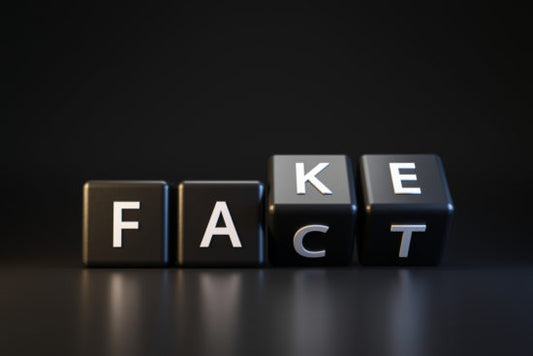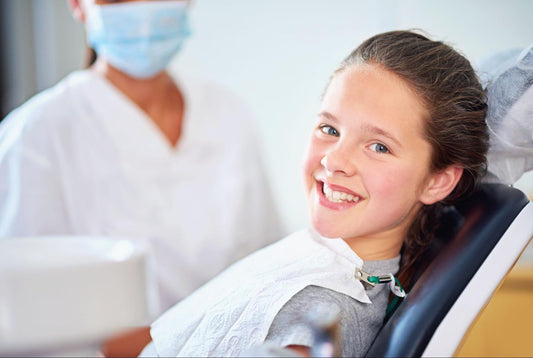Bad Breath After Brushing Teeth? What Are the Causes & How to Fix It

Bad breath can occur to all of us at some point.
However, it usually wears off after brushing the teeth and gurgling some drops of mouthwash. But, what happens when this rather embarrassing situation is persistent and brushing cannot eliminate it?
Halitosis, the scientific name for bad breath may be related to factors that have nothing to do with oral hygiene, in the first place. Its causes can be found even outside the mouth cavity.

If you experience bad breath constantly, even after brushing your teeth, then you need to read the following lines.
In this article, you will discover the most common underlying causes and how to battle this uncomfortable condition.
What Are The Causes Of Bad Breath?
Bad breath can’t only undermine your self-confidence and make you stressed when around people but can also be a sign of a health issue that has not yet been detected.
Here is a list of the most frequent hidden causes:
1. Existing Cavities and Gum Issues
The most common root of halitosis can be found in your teeth and gum condition.
People who have untreated cavities allow odor-causing bacteria to nest in hard-to-reach spots, making their toothbrush removal a challenging task.
The same goes for the existence of gum diseases like bleeding gums (gingivitis) or more severe types (periodontitis) where you may have deep gum pockets and loose teeth that can harbor bacteria.
2. Mouth Dryness
Another mouth-related cause of bad breath is a dry mouth.
Inefficient saliva production can be the result of dehydration, alcohol or drug consumption, smoking, and improper function of salivary glands.
Good salivary gland function is key for many other mouth functions like chewing, eating, swallowing, and talking. It also helps keep the mouth moisturized and clean while maintaining the proper balance of healthy bacteria.
When your mouth gets dry, it creates an ideal environment for bacteria to build up on your teeth and gums, leading to bad breath.
3. Specific Food Consumption
Halitosis can also be the result of specific food consumption. Some foods have an innate strong flavour or odour and this can stay in your mouth even after hours of their consumption.
Just think of garlic or onions for instance. As much as you may brush your teeth the flavor in your mouth may exceed 24 hours, even more in some cases. Not to mention retching which can add to your already bad breath.
4. Excessive Smoking
If you're a heavy smoker, you've likely struggled with bad breath for a while. Unfortunately, brushing alone may not be enough to solve the issue.
This is because excessive smoking messes with your saliva and instills a strong and unpleasant odour in your mouth, making it challenging to disappear even after vigorous brushing, mouthwashing, or chewing gums.
5. Gastroesophageal reflux disease (GERD)
Getting into the realm of health-related causes, gastroesophageal reflux disease (GERD) is often an underlying condition that leads to persistent bad breath even after brushing your teeth.
GERD, also known as chronic acid reflux, is a gastrointestinal system disorder during which acids or undigested food flows back into your esophagus emanating a bad-smelling odour.
6. Other (Underlying) Medical Conditions
Apart from GERD, other underlying medical conditions can be guilty of bad breath as well. People who suffer from:
· constipation or intestinal blockages,
· liver or kidney failure,
· diabetes, or
· peptic ulcers
may often experience halitosis.
This happens because these medical conditions alter the blood’s chemical balance or the body’s bacteria levels. This imbalance then shows up as bad breath on top of other symptoms.
7. Postnasal Drip
Halitosis, finally, can be caused by postnasal drip.
This occurs when you suffer from bronchitis, sinusitis, strep throat, or simply the flu, and mucus drips into your throat from the back of your nose.
Mucus can attract and “imprison” lots of bacteria and dripping behind your mouth can generate bad breath for as long as the underlying condition lasts and without brushing your teeth succeed in eliminating it.
How To Fix Bad Breath When Brushing Teeth Can’t
If brushing your teeth appears to be inefficient and your bad breath persists, then you can try some other remedies before visiting the dentist.
Most of them constitute home remedies as they include substances you can simply find in your kitchen.
Here are the most effective ones:
1.Rinse Your Mouth with Baking Soda
Studies have shown that rinsing your mouth with a solution of water and baking soda for a couple of minutes can eliminate bad breath.
Just add two tablespoons of baking soda to a cup of warm water and rinse your mouth. According to a 2017 study, the result can be better than using mouthwash.
2.Drink Pineapple Juice
Drinking pineapple juice or chewing a slice of pineapple can also help you beat bad breath.
If you choose the juice, make sure it is 100% fresh pineapple juice and not a sugary mixture from the supermarket that can further deteriorate your halitosis.
3.Chew Fennel Seeds
Fennel seeds can freshen up your breath substantially. It is a bad breath remedy that can be traced back to ancient years.
Just nibble on a teaspoon of fennel seeds after eating a heavy odour meal to keep your breath fresh and pleasant.
4.Follow a Healthy Diet – With Lots of Water
Keeping yourself constantly hydrated is a must. As already mentioned, a dry mouth can lead to bad breath.
So, don’t wait to first feel thirsty to drink water. Make sure your water intake per day equals at least 8 glasses.
Besides drinking enough water, it’s also helpful to follow a healthy diet. This is important for your overall well-being and not only for your mouth. Avoid sugar, junk food, coffee, and alcohol. Instead, include fruits and vegetables in your diet.
5.Improve Your Oral Hygiene
Last but not least, to battle your bad breath you must upgrade your oral hygiene. Even if brushing your teeth isn’t working, don’t skip doing it at least twice a day.
Furthermore, don’t forget to use dental floss and mouthwash from a trusted brand to complete your dental care. And if you like chewing gums, make sure they are sugar-free.
FAQs for bad breath
1. Why Do I Have Bad Breath Even After Brushing My Teeth?
If this happens once it’s probably because of something you ate with a strong flavor like garlic or onions.
But, if your bad breath persists, then it may relate to several causes like poor dental care, dry mouth, smoking, and health issues (e.g. gastroesophageal reflux disease, diabetes, intestinal blockage, liver or kidney failure, postnasal mucus drip, etc.).
2. How Can I Beat Bad Breath?
If brushing your teeth doesn’t work, you can turn to some home remedies like rinsing your mouth with water and baking soda, drinking pineapple juice, nibbling fennel seeds, and upgrading your dental care.
3. Will I Need To See My Dentist For My Bad Breath?
If the problem persists, then you should book a visit to your dentist to detect the root cause of your bad breath and suggest the right treatment.
Remember that the root cause can be in your mouth but it may also hide in another part of your body. In this case consult a doctor to prevent things from getting worse.
_________________________________________________________________________






